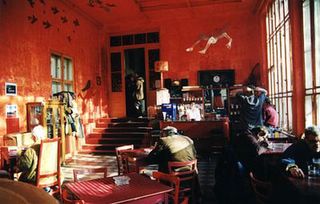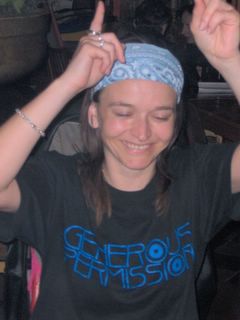Her father is a Sephardic Jew, her mother English, she was born in Brussels, raised in Morocco and now lives in New York.
Natacha Atlas released her first solo LP, Diaspora, in the summer of '95, and in time honoured fashion, the critics scrambled for superlatives. The LP saw Natacha combining the dubby, beat-driven global dance of her longtime associates Transglobal Underground, with the more traditional work of Arabic musicians like Tunisian singer- songwriter Walid Rouissi and Egyptian composer and Oud-master Essam Rashad.

The result was a colection of songs of love and yearning which genuinely fused West and East. Her second LP, Halim, sees Natacha exploring further her deeply felt affinity with Arabic musical heritage.
Natacha moved to England as a teenager, and since then has involved herself in a wide variety of musical projects. Dividing her time between the UK and Brussels, she sang in a variety of Arabic and Turkish nightclubs, and spent a brief stint in a Belgian salsa band called Mandanga. As she shuttled between Northampton and Brussels, however, she began to attract the attention of the Balearic beat crew iLoca! and Jah Wobble, then assembling his Invaders of the Heart.
In '91, both these projects bore fruit. Timbal by ¡Loca! started out as a track on Nation Records' Fuse Two compilation and became a massive club hit, while Wobble's Rising Above Bedlam - five tracks which Natasha co-wrote - attracted much critical acclaim and a Mercury award nomination.
The success of Timbal cemented Natacha's relationship with the ground-breaking Nation Label, who introduced her to Transglobal Underground, at that time enjoying Top 40 success with the anthemic Templehead. As chief collaborator, lead singer and belly dancer with TGU, Natacha has performed all over the world - playing Glastonbury, WOMAD, Reading, Phoenix and the Brixton Academy and many international festivals. At the same time, she has worked with an impressive variety of other musicians, including Apache Indian and Peter Gabriel, and has found the time to contribute to film soundtracks - including Stargate, with David Arnold.





 The result was a colection of songs of love and yearning which genuinely fused West and East. Her second LP, Halim, sees Natacha exploring further her deeply felt affinity with Arabic musical heritage.
The result was a colection of songs of love and yearning which genuinely fused West and East. Her second LP, Halim, sees Natacha exploring further her deeply felt affinity with Arabic musical heritage.
